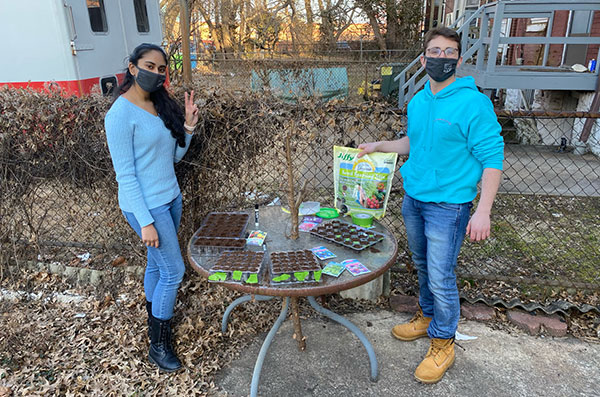New student organization aims to build community among LGBTQIA students in STEM
oSTEM unites LGBTQIA students and their allies through professional development events, activism and an interest in STEM

Engineering can often feel as if it's a very white and very male industry.
It’s can also feel very straight. And, for members of the LGBTQIA community with an interest in STEM, that can create an isolating experience in school and in the workplace.
That’s why Dean Oken, a master’s student studying data analytics & statistics, decided to bring a chapter of oSTEM, which stands for Out in Science, Technology, Engineering, and Mathematics, to the McKelvey School of Engineering, a move that was made even more vital thanks to the COVID-19 pandemic. He currently serves as the president of the WashU chapter.
“I had an idea to build a community around STEM and LGBT+ representation,” Oken said. “I saw other groups such as SHPE, NSBE and SWE, and, one year prior, Proud Network came to campus and increased LGBT+ representation at Olin. I thought it was the perfect time to start something.”
Groups such as the Society of Hispanic Engineers (SHPE), the National Society of Black Engineers (NSBE) and the Society of Women Engineers (SWE) help members of groups traditionally underrepresented in STEM to network and find support among others with similar experiences. oSTEM is a national organization with more than 100 chapters throughout the country that offers similar opportunities to LGBT students and their allies who are interested in STEM.
“When like-minded individuals are put together in a space where they’re more comfortable, they can achieve more because they can focus more on the task at hand and not have to worry about feeling judged,” Oken said. “oSTEM provides that community for like-minded people to come together for professional, activist and social events.”
Initially, finding those like-minded individuals was a challenge for Oken and his executive board. They succeeded by drawing on their own personal networks of friends and peers. Oken and his board shared an interest form in LGBT+ GroupMe groups they were a part of to gauge campus interest in the group.
“I knew that I felt passionate about this idea, and if I was passionate about this idea, there were certainly others who would be passionate about it,” Oken said. “I would have been happy with four or five interested people, but once I took that step, the interest was overwhelming.”
One of those interested people was Maggie Yang, a first-year biomedical engineering student.
“I first learned about oSTEM through a GroupMe message,” Yang said. “Not many other students had heard of a group that offered this kind of representation.”
Yang now serves as the group’s corporate outreach officer and helps plan group events. Despite the pandemic and distance learning, the group has been able to host a number of successful events, including a well-attended panel with Troy Lee Hudson, instrument system engineer in NASA's Jet Propulsion Laboratory, known as “Science Daddy” on Twitter
“It’s a really special club,” Yang said. “It’s great how we started with social events and connecting people with others also in STEM.”
The group now claims more than 90 members since it began in August 2020.
While supporting LGBT+ students is oSTEM’s main goal, Oken said he believes that oSTEMs presence will benefit the university, as well.
“oSTEM is on campus to improve the outcomes for LGBTQ students and the university,” Oken said. “It can attract more students to come to WashU. It can provide internship and job opportunities for students. It can build a network and a community at WashU that didn’t exist before.”
Students interested in joining oSTEM can contact the group on Instagram, Facebook or through email at wustl@chapters.ostem.org. Students who wish to remain confidential can do so.
"Students can engage with the club at any capacity that he, she or they feel comfortable,” Oken said. “And if that student wants to remain confidential, they can still take advantage of the resources in oSTEM and build relationships with oSTEM members.”
Back to News


